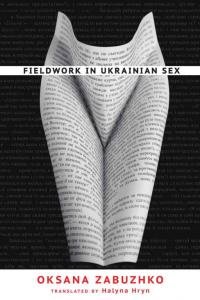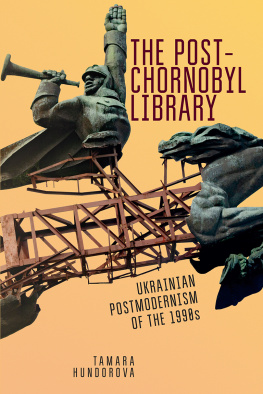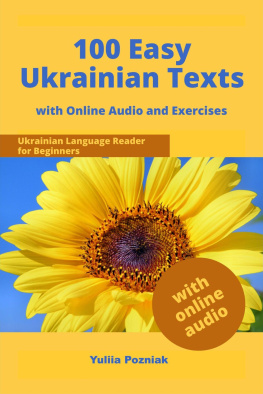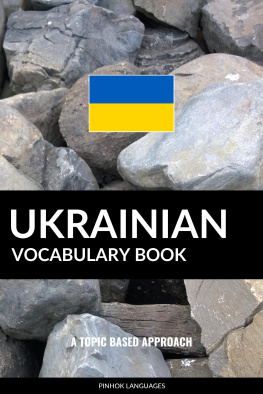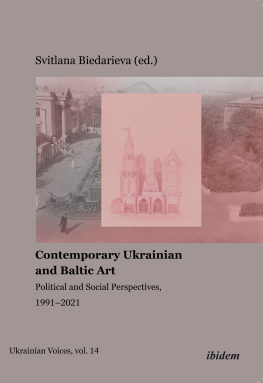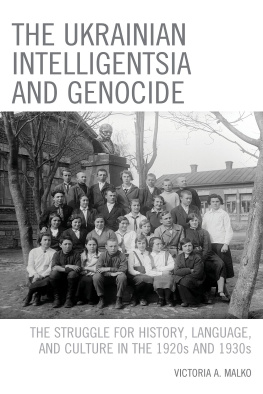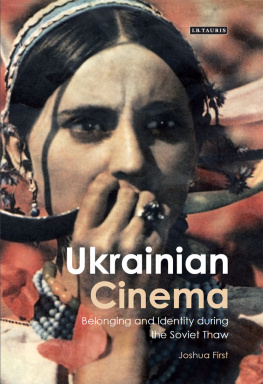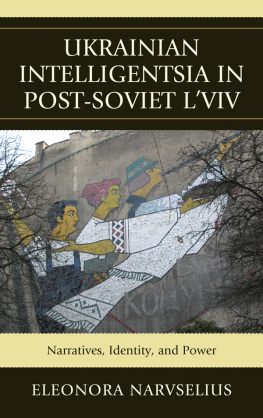THE INTELLECTUAL AS HERO IN 1990S UKRAINIAN FICTION
The Intellectual as Hero in 1990s Ukrainian Fiction
MARK ANDRYCZYK
University of Toronto Press 2012
Toronto Buffalo London
www.utppublishing.com
Printed in Canada
ISBN 978-1-4426-4332-1 (cloth)
Printed on acid-free, 100% post-consumer recycled paper with vegetable-based inks.
Library and Archives Canada Cataloguing in Publication
Andryczyk, Mark, 1969
The intellectual as hero in 1990s Ukrainian fiction / Mark Andryczyk.
Includes bibliographical references and index.
ISBN 978-1-4426-4332-1
1. Ukrainian fiction 20th century History and criticism.
2. Intellectuals in literature. 3. Heroes in literature. I. Title.
PG3924.F5A54 2012 891.793409353 C2011-907110-X
This publication was made possible by the financial support of the Shevchenko Scientific Society, USA, from the Ivan and Elizabeta Khlopetsky Fund.
This publication was made possible by the financial support of the Canadian Foundation for Ukrainian Studies.
University of Toronto Press acknowledges the financial assistance to its publishing program of the Canada Council for the Arts and the Ontario Arts Council.
University of Toronto Press acknowledges the financial support of the Government of Canada through the Canada Book Fund for its publishing activities.
Contents
Acknowledgments
I am thankful to the Harvard Ukrainian Research Institute for providing me with an opportunity to work on my monograph in the Fall of 2006 as a Eugene and Daymel Shklar Research Fellow. I am grateful to the Shevchenko Scientific Society (the Ivan and Elizabeta Khlopetsky Fund) and the Canadian Foundation for Ukrainian Studies for financially supporting the publication of this book. I would also like to thank Yurko Kokh for his permission to use his wonderful painting for the cover of my book.
THE INTELLECTUAL AS HERO IN 1990S UKRAINIAN FICTION
Introduction: Approaching the Post-Soviet Ukrainian Intellectual; or, the Word Intellectual Pronounced with a Ukrainian Accent
There is a joke circulating in contemporary Ukraine that if someone wished to wipe out the entire post-Soviet Ukrainian intellectual scene all it would take is one bomb, thrown at the city of Lviv, during one particular weekend in mid-September. The black humour of this jest takes on even gloomier undertones when one looks at Ukrainian history and the strategies that were implemented by various regimes, throughout the previous two centuries, in order to humiliate, marginalize, compromise, and even exterminate the Ukrainian intellectual. So who are these Ukrainian intellectuals, why do they endure such a precarious existence, and, finally, what are they all doing in Lviv for one weekend every autumn?
The complex task of addressing the first two questions forms the main impetus behind this book. The answer to the third question, on the other hand, is straightforward: annually, for over ten years, in the early fall, the lions share of Ukraines intellectuals gather in the Western Ukrainian city of Lviv to participate in what is known as the Publishers Forum. The Forum has consistently been the single largest cultural event in post-Soviet Ukraine, during which literature presentations are scattered throughout the citys plethora of cafes and theatres, often to the accompaniment of music and visual art performances.
Contemporary Ukraines leading writers gather there for a few days of carousing, catching-up with friends and colleagues, and sharing their latest publications many of which actually focus on Ukrainian intellectuals themselves. And the fact that Ukrainian intellectuals/artists are featured as protagonists in most of the leading books of fiction to have been written since the Soviet Union collapsed offers a key to exploring the initial two questions posed above. The Ukrainian intellectual as a protagonist in Ukrainian literature has, thus far, received very little attention in the scholarly world. But it is an important subject, the analysis of which can provide insight into the complexities of Ukrainian identity as well as into the roles that an intellectual plays in modern-day society.
A general enquiry into post-Soviet Ukrainian literature has not yet been undertaken in an English-language monograph, and this book does not purport to offer such an analysis. It will instead focus on the various approaches taken by several prominent contemporary Ukrainian writers as they treat certain common themes in their fiction an endeavour that leads them into an exploration of crucial issues that are of broad cultural resonance. Specifically, this study comprises an analysis of the construction of the identity of the post-Soviet Ukrainian intellectual protagonist in prose written between 1990 and 2001, a period roughly corresponding to the first decade of independent Ukraines existence. As momentous socio-political changes were taking place in Ukraine, much of the prose written by the countrys newest generation of writers at this time provides especially rich material for various approaches to the intricate task of defining an intellectual.
The origin of the term intellectual is often traced back to Georges Clemenceaus designation of the individuals who defended Alfred Dreyfus against conservative authorities during Frances renowned Dreyfus affair at the turn of the twentieth century.
Modern discussions concerning intellectuals and their role have centred on their relationship with society and with government or other organs of power. Should the intellectual be concerned with society or remain an outsider? Should the intellectual be politically engaged or indifferent? Should the intellectual be in the service of the government in power or critical of it? Scholars have proposed several prototypes of the intellectual, each of which features different combinations of the aforementioned in/out and engaged/disengaged variables. The philosopher-king, the messianic bohemian, the court jester, and a rational Robin Hood are four such models that help illustrate the various approaches applied to these relationships.
But Saids intellectual is not simply a romantic Robin Hood, but an individual who rationally researches suppressed sources and outwits his opponent in debate.
Other approaches to the role and position of the intellectual regarding society and government counter these modes on some points while mirroring them on others. Ahmad Sadri writes that Intellectuals are inherently a universally alien and alienated caste.
Additional confusion stems from the existence of the two terms intellectuals and intelligentsia. The latter term emerged in the Russian Empire (including Russian-ruled Ukraine) in the mid-nineteenth century and comes from the Latin word intelligentia (intelligence). According to the Encyclopedia of Ukraine, intelligentsia refers to a broad social group consisting of professionally trained specialists while
Next page

